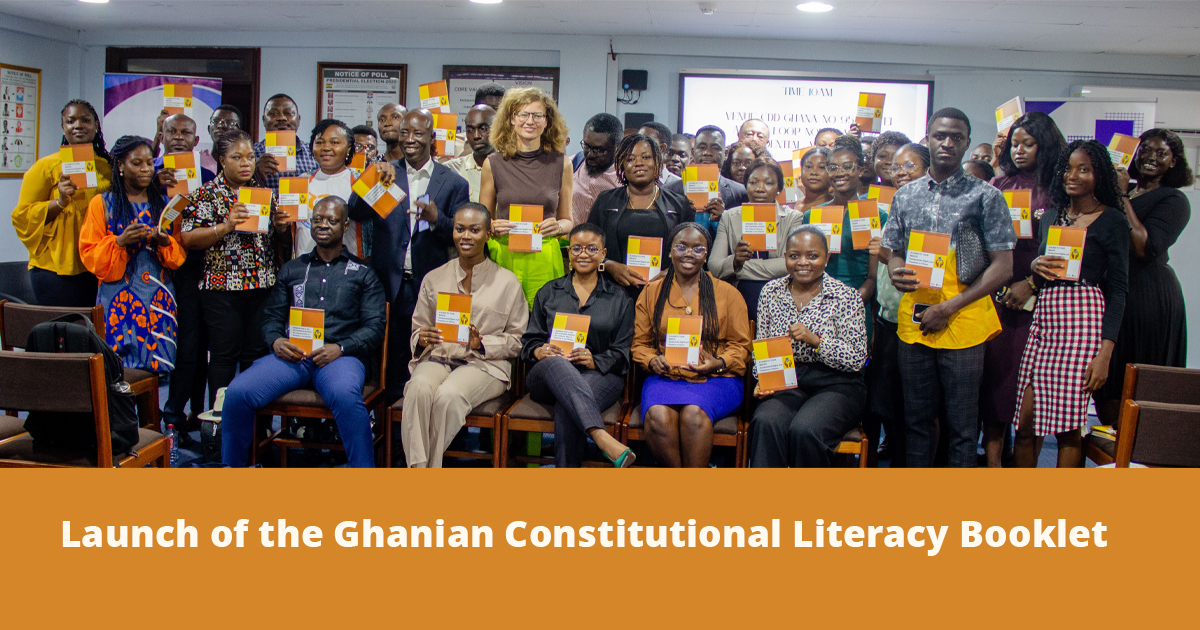On 7 September in Accra, Ghana, The Centre for Human Rights (the Centre) and Konrad Adenauer Foundation (KAS) in partnership with Parliamentary Network Africa (PNAfrica) and the Ghana Centre for Democratic Development (CDD-Ghana) held the launch of “A Guide to Your Rights: Fundamental Human Rights and Freedomsin Ghana” booklet. The launch was attended by various members of civil society, academia, representatives from the government, students and members of the media.
This booklet forms part of a Constitutional Literacy Project which is housed under the KAS Rule of Law Program for Sub Saharan Africa. KAS in partnership with the Centre have developed simple reference books for non-lawyers which summarise the Bill of Rights in selected ‘Anglophone’ countries in Sub-Saharan Africa with the aim of promoting constitutional literacy and civic education. The booklet introduces the reader to human rights, the history of the constitution of Ghana, the structure of the court system in Ghana and a simplified version of Chapter 5 of the Constitution-fundamental human rights and freedoms. Dr Stefanie Rothenberger the Director of the KAS Rule of Law Program for Anglophone Sub-Saharan Africa gave an introduction to the project from the perspective of the Rule of Law Program for Anglophone Sub-Saharan Africa. She reiterated the Program’s commitment to constitutional literacy, democracy and the rule of law. Dr Rothenberger highlighted the importance of centring citizens in endeavours to strengthen the rule of law in Africa and other parts of the world and remarked that ‘what is the purpose of a Constitution, if the people who supposedly brought it to life, own it and enjoy the protection of its provisions, are ignorant of its content’ – highlighting the necessity of the booklet and the importance of constitutional literacy.
The preamble of the Constitution of Ghana commits to values such as, the rule of law and protection and preservation of Fundamental Human Rights and Freedoms. As provided for in Article 1, the Constitution is the supreme law of Ghana, and all actions should be in accordance with the constitution. Furthermore, all exercises of power including the exercise of public authority must be derived from and in line with the Constitution. The supremacy of the Constitution and the checks and balances it imposes on the exercise of public authority is an important aspect of the protection and promotion of democracy. The implications of Constitutional supremacy and its importance in Ghana’s democracy makes constitutional literacy and civic engagement increasingly important.
In her opening remarks, Ms Bonolo Makgale, Programme Manager of the Democracy and Civic Engagement Unit at the Centre highlighted the importance of constitutional literacy and constitutionalism in enhancing the quality of democracy in Ghana. Constitutionalism is not only crucial for democratic governance. It is important for legitimacy of the state, its credibility, and acceptability as the governance authorities. Moreover, constitutionalism ensures people’s participation and confidence as the electorate in a state.
Inaccessibility of the constitution and the law are some of the main impediments to citizen’s active participation in governance. When citizens are able to understand the laws that govern them, they are equipped with the knowledge that enables them to participate and engage constructively in governance issues. Mr Paul Osei-Kuffuor, Programmes Manager at CDD-Ghana echoed the sentiments of the importance of the booklet as a tool to raise awareness among citizens and increase knowledge required for constructive civic discourse. Additionally, the booklets serve as a tool to empower the citizens to effectively participate in governance issues and to effectively protect their own human rights while fulfilling their obligations as provided for the constitution of Ghana.
Joana Oppong, Ghana Country Programme Officer at PNAfrica reemphasised the pivotal role of an informed citizenry as the bedrock for democracy and in the promotion of democratic ideals such as accountability, good governance and transparency. The promotion of constitutional literacy and active citizenship becomes a force which enhances public participation and ultimately improve the quality of democracy in African and Ghana in particular.
Chief State Attorney Madam Patience Adumuah-Lartey, speaking on behalf of the Attorney General, underscored the crucial role of the booklet in bringing the Ghanaian Constitution to life and making it accessible to ordinary citizens. This transforms the Constitution from a document that is far removed from the people to a living document that finds meaning and application in the every day lives of those it is intended to serve and protect.
A critical element of rights protected by the Constitution of Ghana which include various rights and freedoms such as equality and freedom from discrimination, freedom of expression, association and assembly, among others, is that the constitution ensures protection of these rights by the courts. As such, not only does the constitution delineate the rights and freedoms accessible to Ghanaian citizens and individuals in Ghana, but also establishes mechanisms for safeguarding these rights and avenues for redress in cases of infringement. However, these provisions alone without understanding or enforcement are merely words on paper; it is within their application that they find power. It is within this context that the promotion of constitutional literacy and active citizenship is of paramount importance; it is a step further in closing the gap between the provisions and commitments that are made on paper and the lived experiences of people. It ensures that people are not only aware of the provisions but also aware of what they mean for them and how to enforce and adhere to these provisions.
For more information, please contact:

Tel: +27 (0) 12 420 4199
Fax: +27 (0) 86 580 5743
bonolo.makgale@up.ac.za

Fax: +27 (0) 86 580 5743
tariro.sekeramayi@up.ac.za
